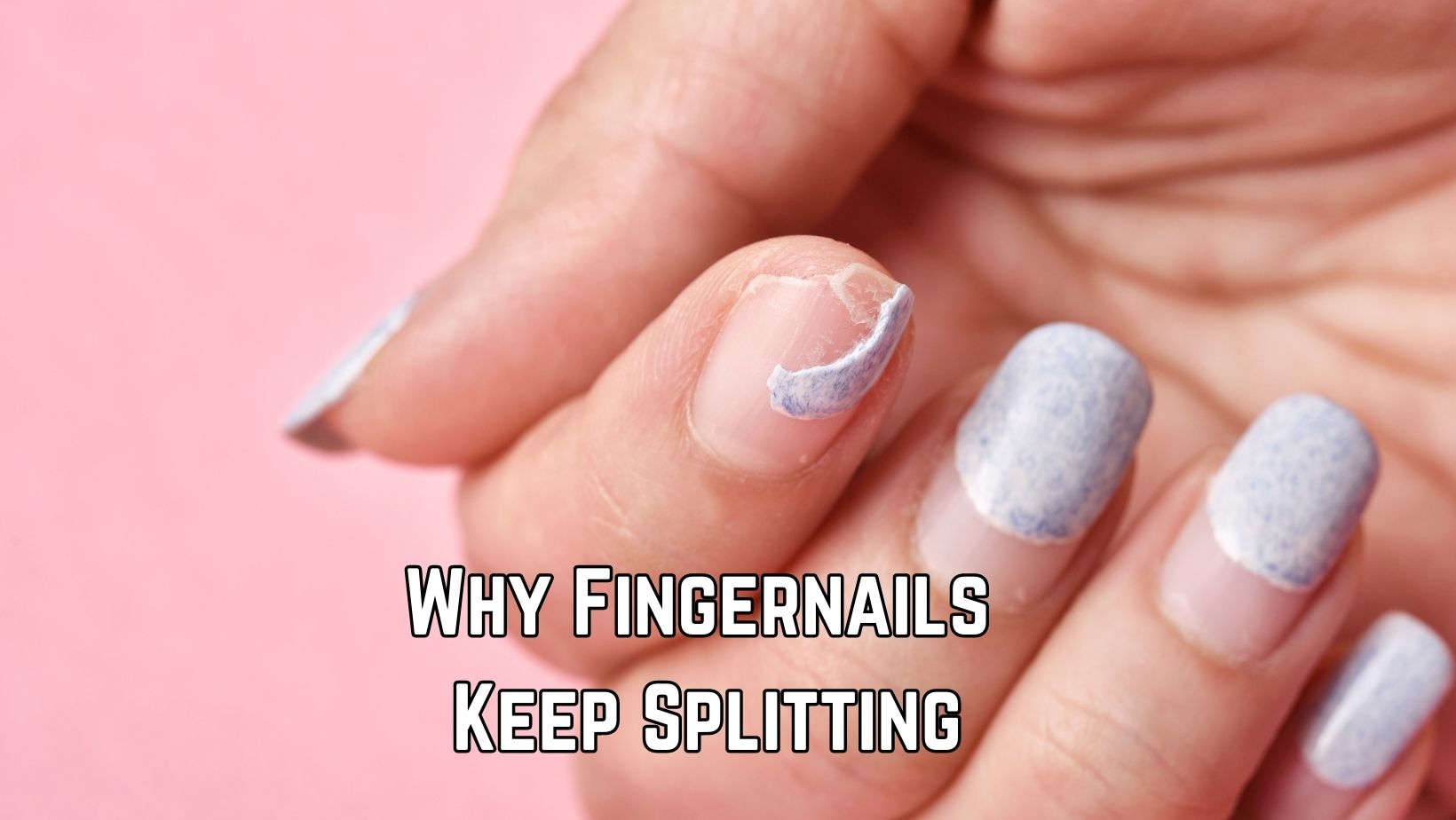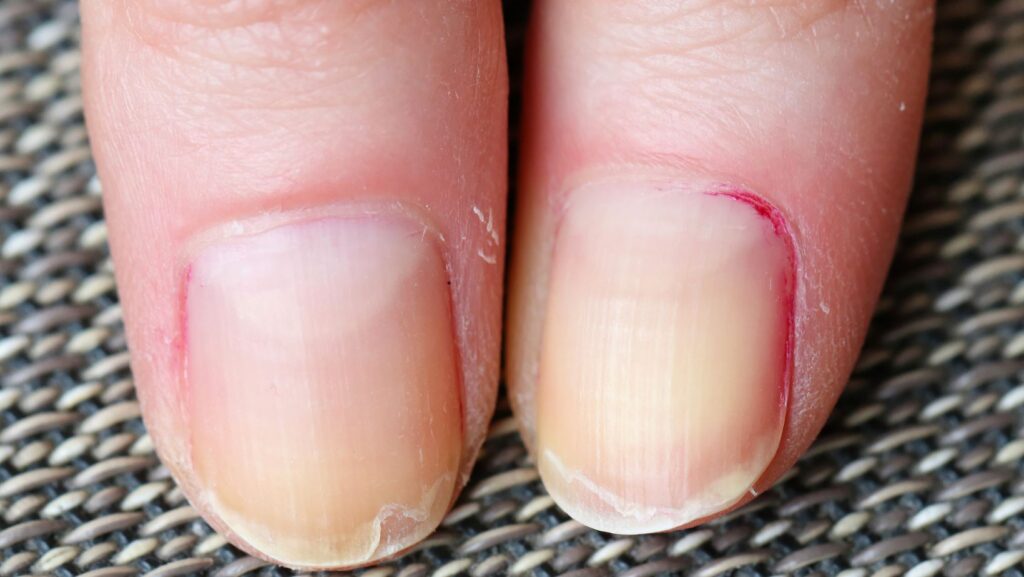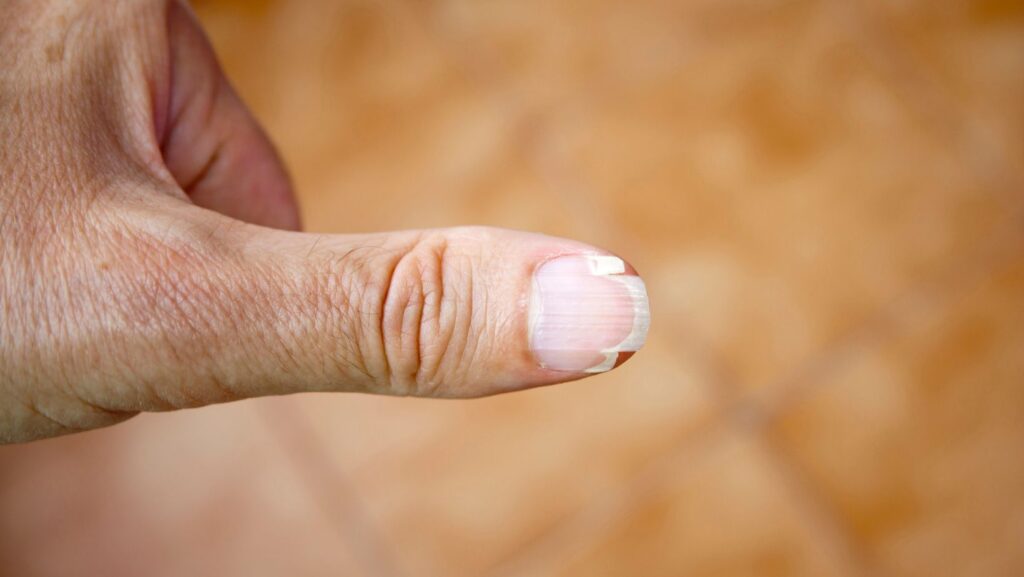
What is Nail Splitting?
Nail splitting is a common condition in which the nails become weak, brittle, and prone to cracking or breaking. The nails may split vertically or horizontally, and the splitting may occur in one or several nails.
Nail splitting can be caused by a variety of factors, including nutritional deficiencies, exposure to harsh chemicals, trauma, aging, hormonal changes, and underlying health conditions.
In some cases, nail splitting may also be a side effect of certain medications or treatments. Nail splitting can be painful, and it can also be a cosmetic concern for some individuals. Treatment for nail splitting depends on the underlying cause and may include lifestyle changes, nutritional supplements, medications, or surgery in severe cases.
Types of Nails Splitting
- Longitudinal splitting: This type of splitting occurs when the nail splits vertically down the middle or off to one side. It can be caused by injury or trauma, nutritional deficiencies, or genetic factors.
- Horizontal splitting: Also known as Beau’s lines, this type of splitting occurs when a horizontal line appears across the nail plate. It can be caused by an injury, illness, or a reaction to medication.
- Brittle nails: Nails that are dry, thin, and brittle can be more prone to splitting and breaking. This can be caused by a lack of moisture, nutrient deficiencies, or exposure to harsh chemicals.
- Onychoschizia: This refers to the condition where the nail tips split or flake off in layers. It can be caused by a lack of moisture, overuse of nail polish or other nail products, or exposure to chemicals.
- Onychorrhexis: This is a condition where the nails are weak, thin, and prone to splitting or breaking. It can be caused by nutritional deficiencies, hormonal imbalances, or certain health conditions.
If you are experiencing any type of nail splitting, it is important to identify the cause and take steps to prevent further damage. Consult with a dermatologist or healthcare provider to determine the best course of treatment for your specific condition.
8 Reasons Why Fingernails Keep Splitting
- Lack of moisture: Dry nails are more prone to splitting and breaking. If you’re not moisturizing your nails regularly, they may become brittle.
- Exposure to harsh chemicals: Exposure to chemicals like detergents, cleaners, and nail polish removers can weaken your nails, causing them to split and break.
- Nutrient deficiencies: A lack of essential vitamins and minerals, such as biotin, iron, and zinc, can lead to brittle nails.
- Aging: As we age, our nails tend to become weaker and more brittle.
- Health conditions: Certain health conditions, such as anemia, thyroid disease, and psoriasis, can affect nail health and cause splitting or brittleness.
- Hormonal changes: Changes in hormones, such as those that occur during pregnancy or menopause, can affect nail health.
- Trauma: Trauma to the nail, such as from injury or repeated pressure, can cause splitting or cracking.
- Genetics: Some people may simply have naturally weaker nails that are more prone to splitting or breaking.
If you’re experiencing frequent nail splitting or brittleness, it may be a good idea to see a dermatologist to rule out any underlying health conditions and get personalized advice on how to improve your nail health.

7 Tips To Avoid Fingernails Splitting
Splitting or brittle fingernails can be a frustrating and painful problem, but there are several things you can do to help strengthen them and prevent further damage. Here are some tips on what to do:
- Keep your nails moisturized: Dry nails are more likely to split and break. Apply moisturizer or nail oil to your nails and cuticles regularly to help keep them hydrated.
- Avoid harsh chemicals: Exposure to chemicals like detergents, cleaners, and nail polish removers can weaken your nails. Wear gloves when using these products or try to avoid them altogether.
- Take supplements: Vitamins and minerals like biotin, iron, and zinc are essential for healthy nail growth. Consider taking a supplement or eating foods that are rich in these nutrients.
- Trim your nails regularly: Keeping your nails short can help prevent them from splitting or breaking. Use sharp, clean nail clippers to trim your nails straight across.
- Use a protective base coat: Applying a base coat before nail polish can help protect your nails and prevent them from becoming brittle.
- Don’t bite your nails: Biting your nails can weaken them and make them more prone to splitting and breaking. Try to break this habit if you can.
- See a dermatologist: If your nails continue to split despite these measures, it may be a sign of an underlying health condition. A dermatologist can help diagnose and treat the issue.
Cracked, Brittle and Vertical Split Nails: Causes, Treatments, and Prevention
Causes:
- Lack of moisture: Dry nails are more prone to cracking, splitting, and breaking.
- Nutrient deficiencies: Essential vitamins and minerals such as biotin, iron, and zinc are crucial for healthy nail growth.
- Exposure to harsh chemicals: Chemicals found in detergents, cleaners, and nail polish removers can weaken nails.
- Aging: As we age, our nails can become weaker and more brittle.
- Trauma: Repeated pressure or injury to the nails can cause them to crack or split.
- Health conditions: Certain conditions such as anemia, thyroid disease, and psoriasis can affect nail health.
- Hormonal changes: Hormonal changes during pregnancy or menopause can affect nail health.
Treatments:
- Moisturize: Apply moisturizer or nail oil to your nails and cuticles regularly to keep them hydrated.
- Supplements: Consider taking supplements such as biotin or eating foods rich in vitamins and minerals such as iron and zinc.
- Protective nail polish: Use nail polish with added vitamins and minerals to strengthen nails and protect them from harsh chemicals.
- Trim: Keep nails trimmed and avoid using them as tools to prevent further damage.
- See a dermatologist: If your nails continue to crack or split, it may be a sign of an underlying health condition. A dermatologist can help diagnose and treat the issue.
Prevention:
- Wear gloves: Wear gloves when using harsh chemicals or cleaning products.
- Avoid trauma: Try to avoid activities that can cause repeated pressure or trauma to your nails.
- Healthy diet: Eat a healthy diet with plenty of vitamins and minerals.
- Avoid nail-biting: Biting your nails can weaken them and cause further damage.
- Regular check-ups: Regularly check your nails for any changes or signs of damage.
Summary
By taking these steps, you can help prevent your nails from cracking, splitting, or becoming brittle, and keep them healthy and strong.
By taking these steps, you can help strengthen your nails and prevent them from splitting or breaking.

Hi Everyone, BeYoungAholic’s aim is to help women who have lost their self-confidence because of the way they look. We will provide you tips and bits of advice on how to take care of yourself and maintain your youthful look. So, Enjoy the blog!

